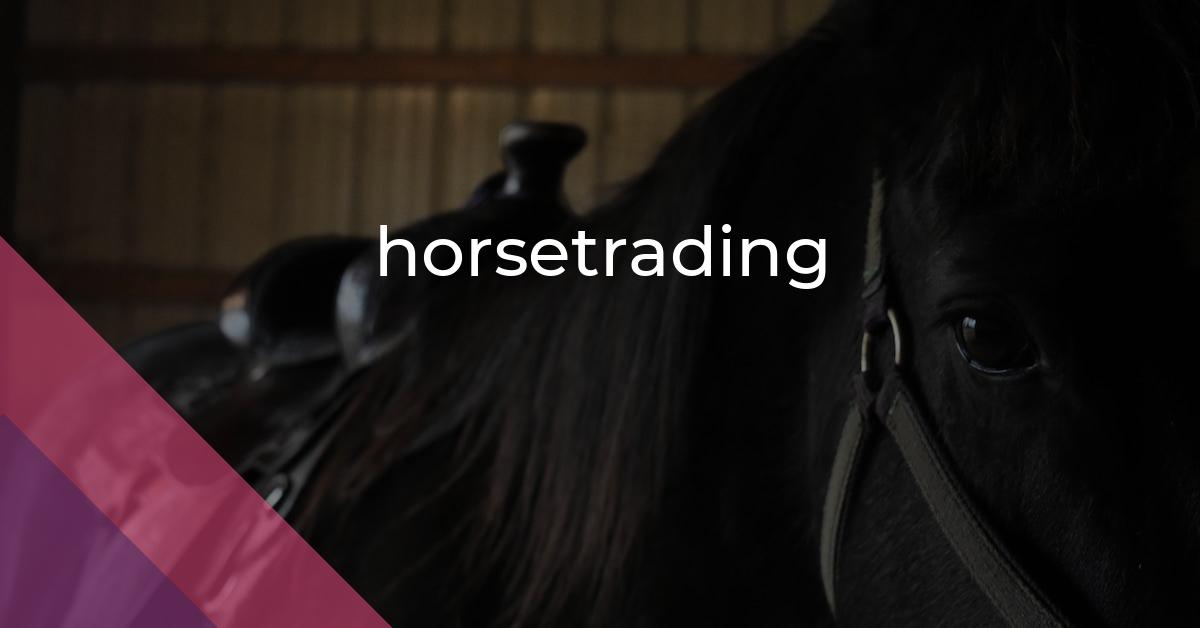horsetrading: Idiom Meaning and Origin
What does ‘horsetrading’ mean?
The idiom "horsetrading" refers to the practice of negotiating or bargaining in a shrewd or calculated manner, often involving give-and-take, compromise, and strategic maneuvering to achieve a desired outcome.

Idiom Explorer
The idiom "horsetrade" means to bargain or negotiate, especially in a shrewd or calculating manner, in order to achieve a desired outcome. It is often used in the context of making deals or compromises, where both parties seek to gain an advantage.
The idiom "horse's mouth" means getting information directly from the source or from someone who has firsthand knowledge or experience about a particular topic.
The idiom "horses for courses" means that different people or things are suited to different tasks or situations.
The idiom "horse's ass" refers to someone who is foolish, incompetent, or makes a fool of themselves. It is often used to criticize someone's behavior or actions, implying that they are behaving stupidly or in a ridiculous manner.
The idiom "horse of a different color" refers to a situation or topic that is completely distinct or unrelated from the one previously mentioned or discussed. It implies a significant change or shift in focus, often catching people by surprise.
The idiom "horse around" means to engage in playful, often rowdy or foolish behavior. It is used to describe someone who is not taking a situation seriously or wasting time by being silly or disruptive.
The idiom "horse and rabbit stew" is not a commonly known expression. It does not have a widely accepted meaning or usage. No reliable sources support its existence as an idiom.
The idiom "high-stakes" refers to a situation in which there is a significant potential gain or loss, usually involving a lot of money or important consequences.
"High horse" is an idiom that means someone is being arrogant, self-righteous, or condescending. It is often used to criticize someone who acts superior or looks down on others.
Shrewd Secrets of Horsetrading
The idiom “horsetrading” is related to the idioms “horsetrade” and “give and take.” In the context of negotiation, “horsetrading” refers to the process of exchanging favors or concessions to reach a mutually beneficial agreement. This article explores the origins and usage of the idiom, shedding light on its connection to the world of politics and business.
Derived from the practice of trading horses, “horsetrading” draws parallels to the intricacies and complexities involved in negotiation. Just as trading horses required evaluating their value and characteristics, negotiation involves assessing the strengths and weaknesses of a deal. This metaphorical application of horse trading to negotiation implies that reaching an agreement is not a simple task, but rather involves strategic exchanges and careful evaluation of value.
In politics, horsetrading often takes place behind closed doors, as politicians engage in backroom deals and negotiations to secure support for their policies or legislation. This can involve offering incentives, making compromises, and leveraging power to win over hesitant or opposing individuals or groups. The idiom “horsetrading” captures the secretive and opaque nature of these negotiations, highlighting the maneuvering and deal-making that occurs under the surface.
Similarly, in the business world, horsetrading refers to the negotiation process between companies or individuals. It involves finding common ground and reaching advantageous deals through trade-offs, concessions, and creative problem-solving. Successfully navigating complex negotiations in business requires a delicate balance of assertiveness, diplomacy, and strategic thinking.
Both in politics and business, horsetrading requires a give and take approach. It involves exchanging favors or concessions, understanding the motivations of the other party, and adapting strategies to achieve favorable outcomes. The idiom “give and take” captures this dynamic nature of negotiation, emphasizing the importance of compromise and mutual agreement.
Overall, the idiom “horsetrading” encapsulates the intricacies and dynamics of negotiation in both politics and business. Its historical origins in the practice of horse trading highlight the complex nature of bargaining and the skillful maneuvering involved. By understanding the meaning and etymology of this idiom, we gain a deeper appreciation for the nuanced world of negotiation and the multifaceted nature of reaching agreements.
Example usage
Examples of how the idiom horsetrading can be used in a sentence:
- The politicians engaged in intense horsetrading to secure enough votes for the bill.
- During the negotiations, there was a lot of horsetrading as both sides tried to reach a compromise.
- In business deals, there is often a fair amount of horsetrading involved to find a mutually beneficial agreement.
More "Negotiation" idioms



